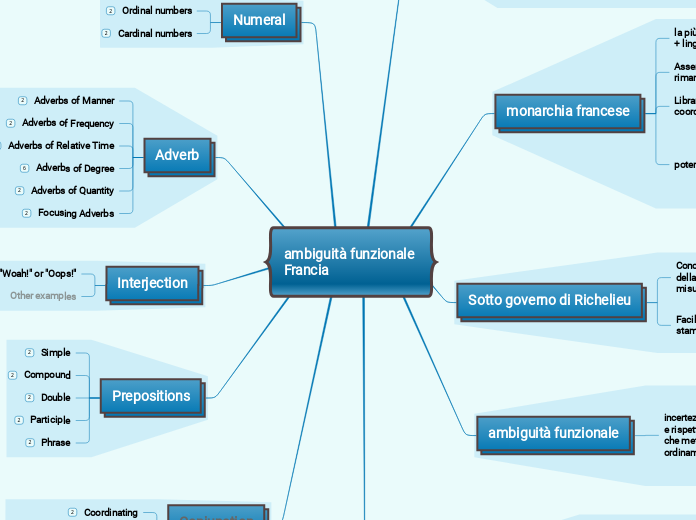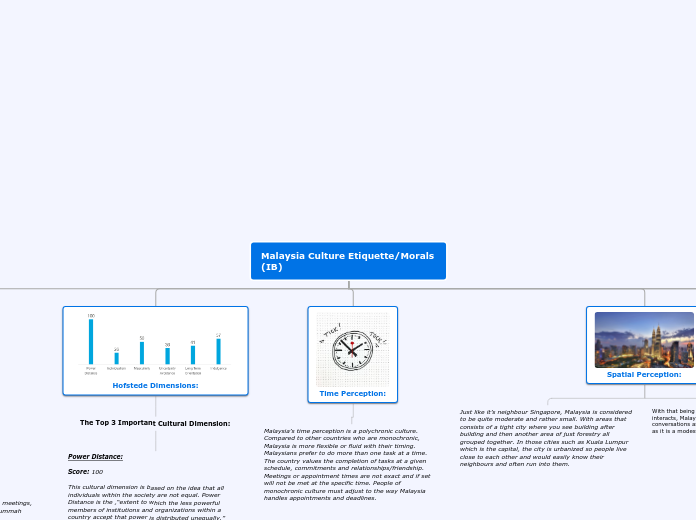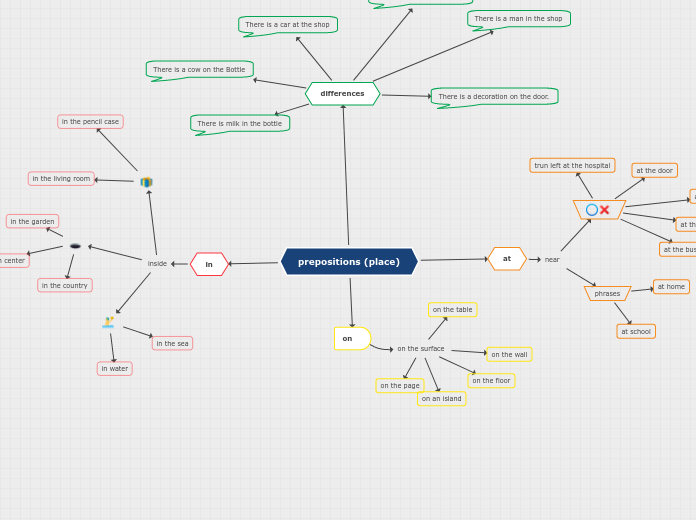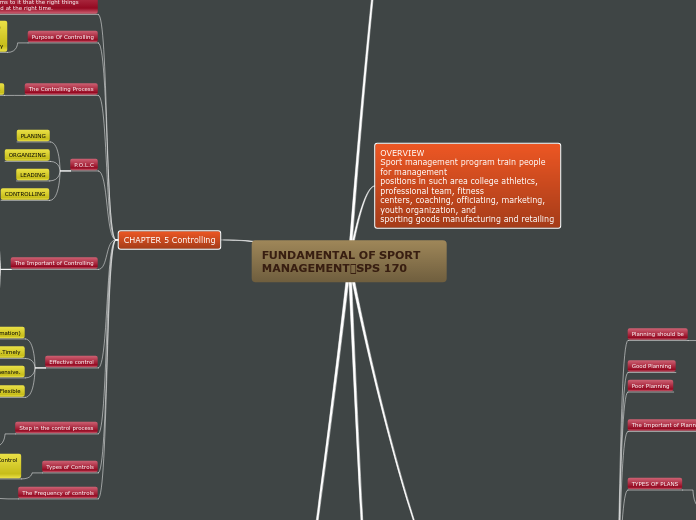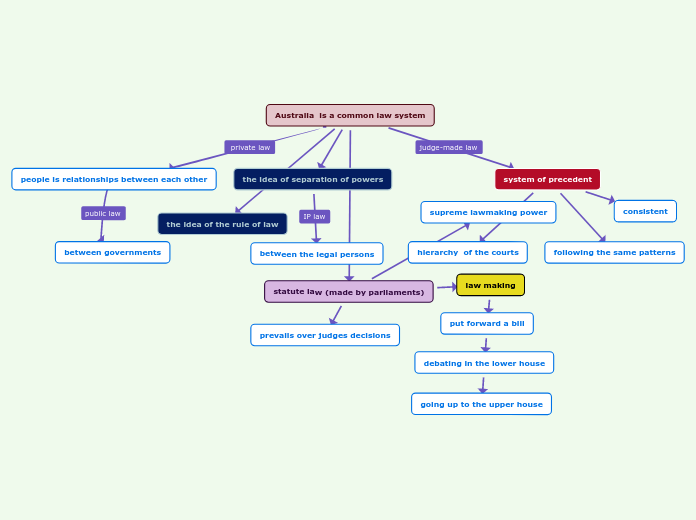ambiguità funzionale
Francia
The part of speech is a category to which a word is assigned according to its syntactic functions. In English the main parts of speech are noun, pronoun, adjective, determiner, verb, adverb, preposition, conjunction, and interjection.
Conjunction
A conjunction is a word like 'if' 'but' or 'and' which is used to connect sentences or clauses together.
Subordinating conjunctions
Subordinating conjunctions are conjunctions that are used at the beginning of subordinate clauses. Some examples of these conjunctions are: although, after, before, because, how, if, once, since, so that, until, unless, when etc.
Although it was raining, I went out.
Coordinating
Coordinating conjunctions always connect phrases, words, and clauses. They are: for, and, nor, but, or, yet, so.
This stew is savory and delicious.
Prepositions
A preposition is one of the most exciting parts of grammar. A preposition is used to describe the location of something in relation to something else.
Phrase
A group of words used with the force of a single preposition is called phrase preposition.
according to, by means of, owing to, with a view to, in place of, in front of, etc.
Participle
Participle preposition consists of words that end in “ing”.
regarding, barring, concerning, considering, etc.
Double
When a preposition consists of more than one word, it is called double preposition.
into, within, upto etc.
Compound
Compound preposition consists of two or more words.
on behalf of, according to, in front of, from across, etc.
Simple
When a preposition consists of one word it is called single or simple preposition.
in, at, on, to for, of, from, up, after, over, under, with, etc.
Interjection
An interjection is used to express emotion in a sentence.
Think of other interjections!
Other examples
"Woah!" or "Oops!"
Adverb
An adverb is used to describe a verb, but it can also describe an adjective or another adverb.
Adverbs normally help paint a fuller picture by describing how something happens.
Focusing Adverbs
Especially, Specifically, Merely, Either
Adverbs of Quantity
A lot, Little, Much
Adverbs of Degree
The intensifiers strengthen adverbs adjectives and adverbs and down- toners make them weaker.
down-toners
Fairly, Rather
intensifiers
Extremely, Very
Adverbs of Relative Time
Just, Afterward, Soon, Currently
Adverbs of Frequency
Always, usually, Never
Adverbs of Manner
Carefully, Slowly
Numeral
A numeral is a word or phrase that describes a numerical quantity.
Some theories of grammar use the word 'numeral' to refer to cardinal numbers that act as a determiner to specify the quantity of a noun, for example the 'two' in 'two hats'.
Cardinal numbers
One, two..
Ordinal numbers
First, second..
Casi ambiguità funzionale
An article is a word used to modify a noun, which is a person, place, object, or idea. Technically, an article is an adjective, which is any word that modifies a noun.
Caso di Simon
It refers directly to a specific noun or groups of nouns.
Mostra l'imprevedibilità del sistema censorio
tesi miscredenti e libertine
usa l'ambiguità funzionale per mettere contro
la gerarchia ecclesiastica e la monarchia di Luigi XIV
delimitò campo di discussione
Rallentò circolazione dell'opera
Negazione Bousset: vescovo più importante
Approvazione di Pirot: censore ufficiale
Storia critica del vecchio testamento
ambiguità funzionale
A pronoun is a word that can be used in place of a noun, typically after the noun itself has already been stated.
incertezza sulle linee e i limiti da seguire e rispettare nella produzione letteraria che mettono in discussione l'intero ordinamento
Unlike demonstrative pronouns, which point out specific items, indefinite pronouns are used for non-specific things. This is the largest group of pronouns. All, some, any, several, anyone, nobody, each, both, few, either, none, one, and no one are the most common.
Impossibile prevedere il
comportamento delle istituzioni
pressioni informali
antipatie personali
clientelismo
Sotto governo di Richelieu
An adjective is a word that's used to describe a specific noun and to provide more detail to the listener.
Facilitava l'attività degli scrittori e stampatori favorevoli alla monarchia
Superlative adjectives demonstrate a higher level of comparison between entities.
chiudeva il mercato interno
Li proteggeva dalla concorrenza
Concentra il controllo nelle mani di agenti della sovranità che potevano usare misure individuali contro gli oppositori
Expresses a comparison between two entities or groups of entities in quality or degree.
monarchia francese
A noun is defined as a person, place, thing or idea. Proper nouns always begin with a capital letter. Common nouns, which are general words, such as 'cars,' are not capitalized.
potere triangolare
Compound nouns are words where two nouns have been stuck together to make a new noun. Compound nouns should be written as one word, without a hyphen.
parlamento di Parigi
ognuno pensava di
acquisire una posizione di forza
facoltà di teologia
censori reali
Librarie: organo preposto al coordinamento delle attività tipografiche
A noun which refers to a group of things/people.
Assemblea del clero e arcivescovo rimangono fuori
Countable nouns are nouns that can be counted, even if the number might be extraordinarily high.
Uncountable nouns are nouns that come in a state or quantity which is impossible to count; liquids are uncountable, as are things which act
like liquids.
la più efficente del regno
+ lingua ufficiale
Proper nouns are the names of specific people or places. They should always begin with a capital letter.
Mary, Paris
Incipit
A verb is an action word or 'doing' word that signifies movement in some way.
regole della censura chiare e condivise
+ una parte che era un limbo
An auxiliary verb helps the main (full) verb and is also called a 'helping verb.' With auxiliary verbs, you can write sentences in different tenses, moods, or voices.
You have been practicing hard.
confini tra lecito e illecito
A participle is a verb form that can be used as an adjective or to create a verb tense. There are two types of participles: Present participle (ending -ing) and Past participle (usually ending -ed, -d, -t, -en, or -n).
The winning athlete gets a trophy.
particolare attenzione circuito clandestino
A modal is a type of auxiliary (helping) verb that is used to express: ability, possibility, permission or obligation. The main modal verbs in the English language are: can, could, may, might, must, shall, should, will, would.
I might go to the park if I get my homework done.
cristica illuministi dispotismo
A linking verb connects the subject with a word that gives information about the subject, such as a condition or relationship.
You look exhausted after studying all night.
1769- Porter- bergier
A verb with its own meaning: a verb that is not an auxiliary verb.
Create sentences
They have it.
